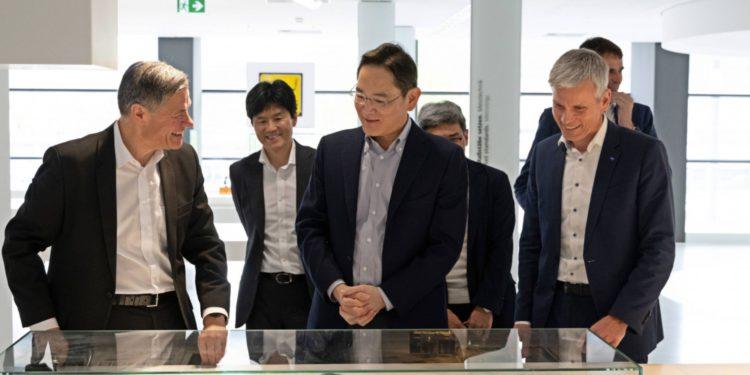Samsung Electronics has partnered with ZEISS Group for the chip production technologies, aiming to enhance yields and boost performance in next-generation memory chips, the company announced on Sunday.
With thousands of core patents in extreme ultraviolet (EUV) technologies, ZEISS is the exclusive supplier of optical systems for ASML’s EUV lithography equipment, crucial for chip production. Each piece of EUV equipment utilizes over 30,000 ZEISS components in semiconductor manufacturing. EUV technology is widely recognized as the cornerstone for semiconductor fabrication.
In a strategic alliance, Samsung aims to enhance the production efficiency of its memory chips through its collaboration with ZEISS. This partnership seeks to elevate Samsung’s competitiveness in the chip business by optimizing yields and enhancing overall performance.
During his recent trip to Europe, Samsung Electronics Chairman Lee Jae-Yong engaged with key executives from Zeiss, a critical collaborator for the Korean tech giant’s artificial intelligence chip market ambitions. This partnership signals Samsung’s determination to leverage Zeiss’s expertise in optical systems and advanced lithography technologies.
Lee engaged in discussions with ZEISS Group CEO Karl Lamprecht and Zeiss Semiconductor Manufacturing Technology CEO Andreas Pecher, exploring long-term partnerships in EUV technology and semiconductor equipment research and development. They exchanged ideas on the latest chip technologies and discussed their roadmap for a mid-to longer-term partnership. Lee also had the opportunity to observe the production process of ZEISS equipment firsthand by visiting one of the German factories.
Samsung has broader expansion plans in the foundry and logic chip businesses, responding to the growing demand for advanced chips in the global market. As Samsung Electronics leads the dynamic random-access memory (DRAM) chip production globally, ZEISS’s expertise in EUV technology, with over 2,000 core patents, complements Samsung’s endeavors in high-performance chip manufacturing.
ZEISS Group plans to expand its presence in the Korean market by investing approximately 48 billion won (about $34.8 million) in building a research and development center. This investment, set to continue through 2026, is expected to bring a bilateral alliance between Samsung and ZEISS.
Industry giants like TSMC and Intel are developing cutting-edge chip technologies in advanced chip manufacturing. TSMC, the leading contract chip manufacturer, has announced plans to introduce the 1.6 nm process, while Intel aims to commence mass production with the 1.8 nm process.
On the other hand, Samsung Electronics is focused on leading microfabrication process technology under 3 nanometers, with plans to mass-produce sixth-generation 10-nanometer DRAM chips this year using EUV lithography technology.
Fueled by the partnership in extreme ultraviolet (EUV) technology, Samsung Electronics is gearing up to begin mass production of its sixth-generation 10-nanometer-class DRAM by the end of this year.
Additionally, during his trip, Executive Chairman Lee is scheduled to hold business meetings with local clients in Germany, France, and Italy, aiming to identify potential growth opportunities.
This proactive engagement aligns with Samsung’s strategy to collaborate with global IT leaders to advance chip technologies, which is evident from Lee’s previous meetings with Meta CEO Mark Zuckerberg, ASML CEO Peter Wennink, and Nvidia CEO Jensen Huang.
As the demand for high-performing memory chips surges amid the ongoing AI boom, Samsung Electronics is aggressively pursuing the commercialization of 2nm chips by 2025 and 1.4nm chips by 2027, following the successful mass production of 3nm chips last year.
Also Read:
- Korean Air, Hyundai, KT Lead Successful UAM Operations in Test
- Hyundai Unveils ST1: Electric Work Vans with Futuristic Design
- KT Launches Responsible AI Center: Safeguarding the Future of Artificial Intelligence
- LG and Kakao Mobility Collaborate for Robot Last-Mile Delivery
- Collaborative Effort: South Korean Telecom Leaders Accelerate Rural 5G Deployment







